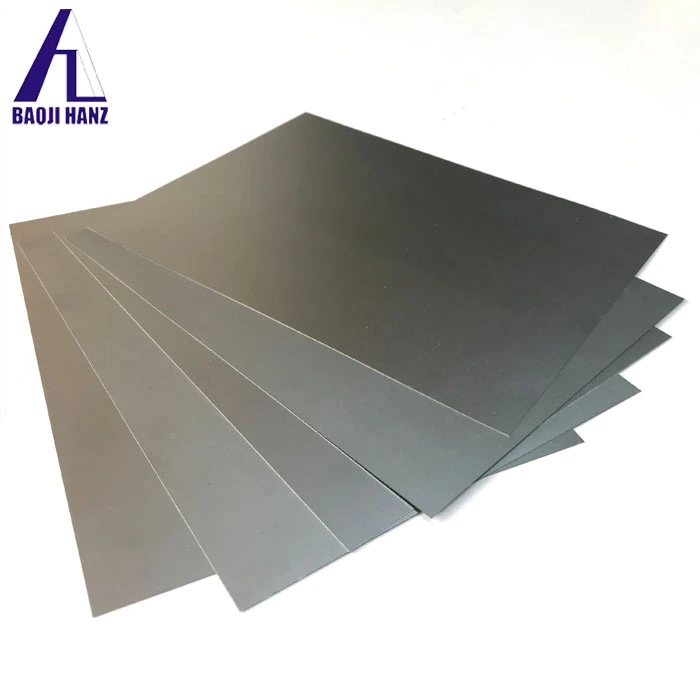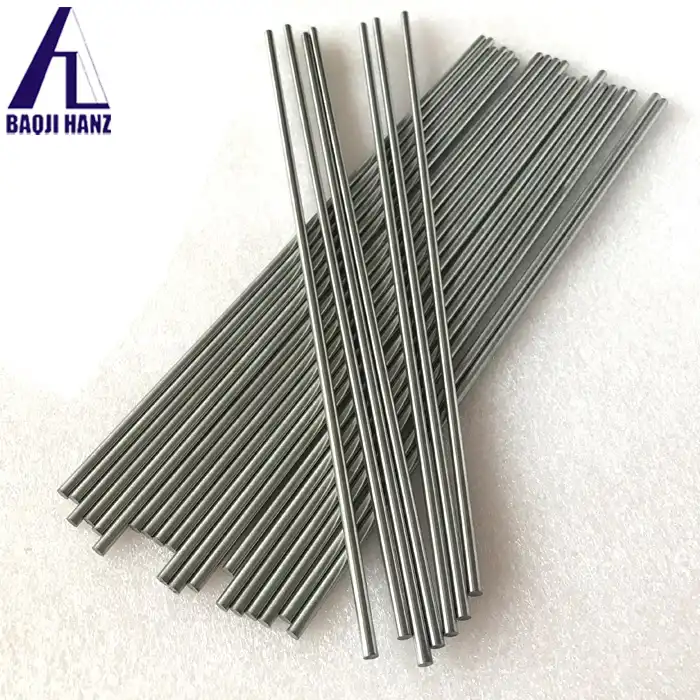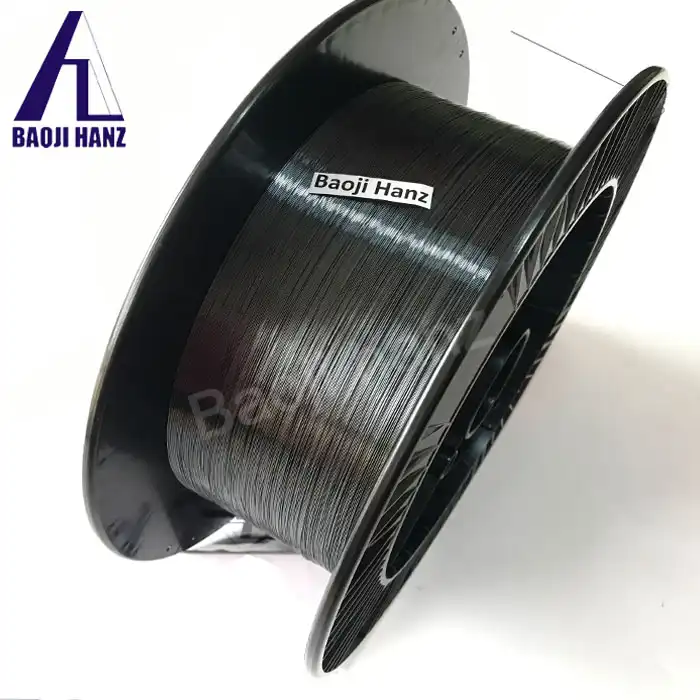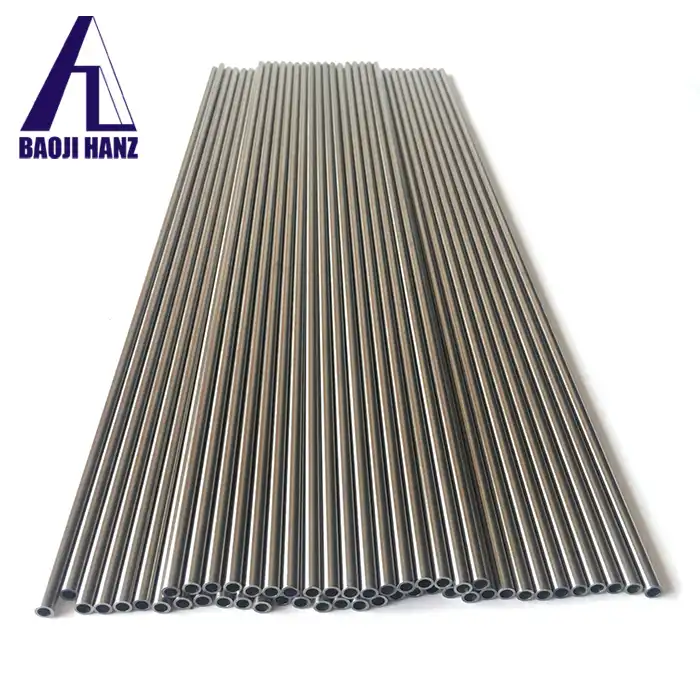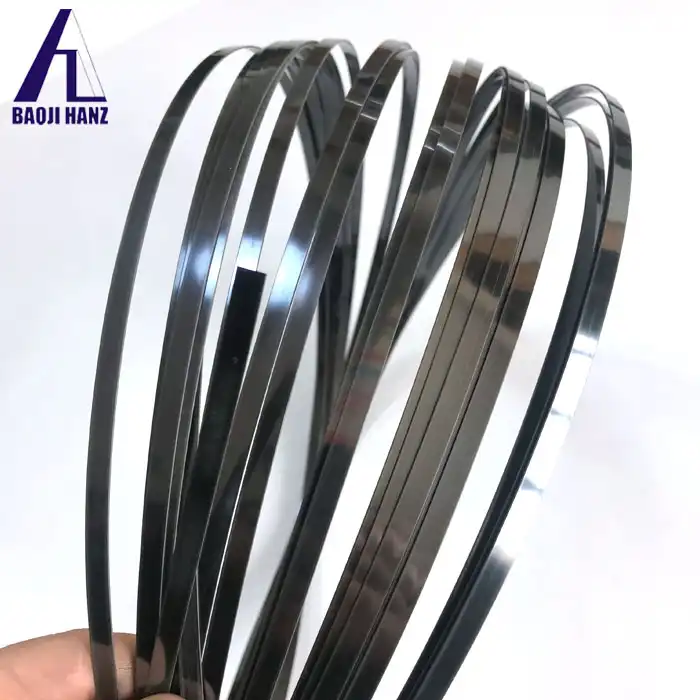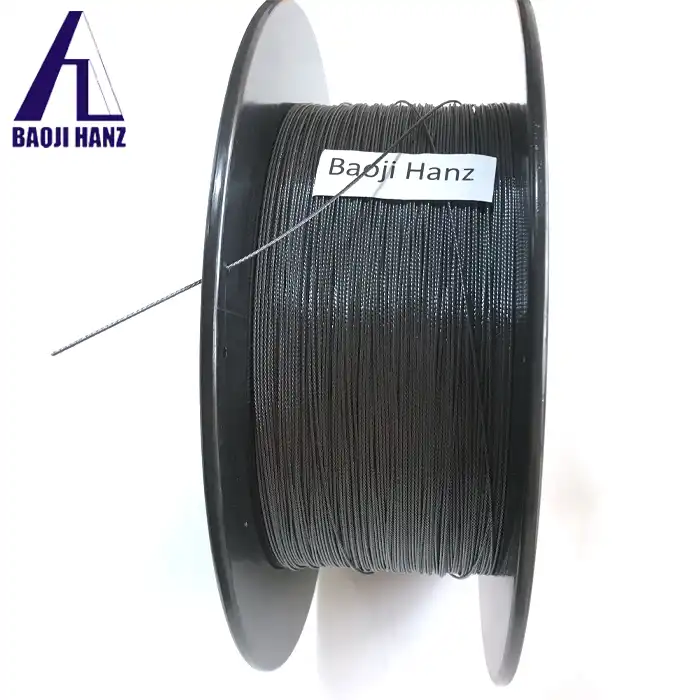What are the Advantages of Using Capillary Nickel Titanium Tubes?
2025-04-17 20:04:11
Capillary nickel titanium tubes represent a significant advancement in materials science, offering unique properties that make them invaluable across various industries. These specialized tubes, manufactured from high-quality nickel titanium alloy (Nitinol), combine remarkable mechanical characteristics with exceptional performance capabilities. Baoji Hanz Metal Material Co., Ltd., with its sophisticated production facilities and expert team, has positioned itself as a global leader in the development and manufacturing of these advanced tubes. In this comprehensive exploration, we'll examine the numerous advantages that capillary nickel titanium tubes provide and why they're becoming increasingly essential in modern applications.
The advantages of using capillary nickel titanium tubes are numerous and significant. These specialized tubes, crafted from Nitinol alloy (55% nickel, 45% titanium), offer exceptional properties including shape memory effect, superelasticity, and outstanding corrosion resistance. Their unique ability to return to a predetermined shape when subjected to specific temperatures makes them invaluable in applications requiring precision and reliability. With outer diameters as small as 0.1mm and inner diameters of 0.05mm, capillary nickel titanium tubes provide unparalleled flexibility for miniaturized components while maintaining structural integrity. Their biocompatibility makes them ideal for medical applications, while their durability and performance in extreme conditions serve aerospace, automotive, and industrial sectors. The versatility of capillary nickel titanium tubes, combined with customization options available from manufacturers like Baoji Hanz Metal Material Co., Ltd., makes them an increasingly essential material for innovative applications across multiple industries.
Unparalleled Material Properties of Capillary Nickel Titanium Tubes
Shape Memory Effect: Revolutionizing Design Possibilities
The shape memory effect of capillary nickel titanium tubes represents one of their most remarkable and valuable properties. This phenomenon allows the material to "remember" and return to its original shape after deformation when exposed to specific temperature conditions, offering unprecedented design flexibility for engineers and manufacturers. When a capillary nickel titanium tube is deformed at one temperature, it can maintain that deformed shape until heated above its transformation temperature, at which point it recovers its original, pre-programmed form. This exceptional characteristic enables the development of self-expanding medical devices, temperature-activated actuators, and innovative aerospace components. The Capillary Nickel Titanium Tube, manufactured by Baoji Hanz Metal Material Co., Ltd., demonstrates this capability with remarkable consistency, with tubes available in customizable lengths and diameters as small as OD1.61mm. The shape memory effect of these tubes is particularly valuable in applications where remote activation or automatic adjustment is required, as they can generate significant force during the shape recovery process. In medical applications such as stents, this property allows devices to be compressed for minimally invasive delivery and then expand to their functional shape once deployed in the body, significantly improving patient outcomes and reducing recovery times.
Superelasticity: Flexibility Beyond Conventional Materials
The superelastic properties of capillary nickel titanium tubes set them apart from traditional metal alloys, making them indispensable in applications requiring extreme flexibility and resilience. Unlike conventional materials that permanently deform when stretched beyond their elastic limit, superelastic nickel titanium tubes can undergo substantial deformation—up to ten times that of ordinary metals—and still return to their original shape when the stress is removed, without requiring temperature change. This remarkable characteristic stems from the unique crystalline structure of the Nitinol alloy, which allows for a stress-induced phase transformation that accommodates large strains without permanent deformation. Manufactured by Baoji Hanz Metal Material Co., Ltd. to meet ASTM F2063 standards, these capillary nickel titanium tubes maintain their superelasticity even after thousands of deformation cycles, ensuring exceptional durability and reliability. The practical applications of this property are vast, from flexible medical guidewires and orthodontic archwires to vibration-dampening components in aerospace and automotive industries. In minimal access surgery, superelastic capillary nickel titanium tubes enable the creation of instruments that can navigate through complex anatomical structures without kinking or permanent deformation, revolutionizing many medical procedures. Additionally, their ability to absorb and dissipate energy makes them ideal for applications requiring shock absorption or vibration damping, such as in high-performance mechanical systems or earthquake-resistant structures.
Corrosion Resistance: Ensuring Longevity in Challenging Environments
The exceptional corrosion resistance of capillary nickel titanium tubes contributes significantly to their growing adoption in demanding applications across various industries. Unlike many conventional metals and alloys, nickel titanium tubes naturally form a stable, protective oxide layer on their surface, providing outstanding resistance to corrosion even in harsh environments containing chlorides, body fluids, or industrial chemicals. This inherent corrosion resistance of the Nitinol alloy (55% nickel, 45% titanium) makes capillary tubes manufactured by Baoji Hanz Metal Material Co., Ltd. particularly valuable for long-term implantable medical devices, marine applications, and chemical processing equipment. The tubes, available with minimum inner diameters of 0.05mm, maintain their structural integrity and functional properties even after prolonged exposure to corrosive conditions, significantly extending their service life compared to alternative materials. This resistance to degradation ensures consistent performance over time, reducing maintenance requirements and replacement costs. In medical applications, the corrosion resistance of these tubes is crucial for devices that must function reliably within the human body for years, such as stents or heart valve frames, as it prevents metal ion release that could potentially trigger adverse physiological responses. Similarly, in industrial settings, where exposure to aggressive chemicals or fluctuating environmental conditions is common, the superior corrosion resistance of capillary nickel titanium tubes translates to enhanced system reliability and reduced downtime, making them an economically advantageous choice despite their higher initial cost compared to conventional materials.
Applications and Versatility of Capillary Nickel Titanium Tubes
Medical Innovations: Transforming Patient Care
Capillary nickel titanium tubes have revolutionized medical device manufacturing, enabling breakthrough technologies that significantly improve patient outcomes across numerous specialties. These tubes, available from Baoji Hanz Metal Material Co., Ltd. with diameters as small as 0.1mm and certified to ISO13485:2016 and EU CE standards, have become indispensable in the production of self-expanding stents, guidewires, catheters, and surgical instruments. Their unique combination of biocompatibility, superelasticity, and shape memory properties makes them ideal for minimally invasive procedures, as devices can be compressed into smaller forms for delivery and then expand to their functional shape once positioned correctly within the body. The nitinol alloy used in these capillary tubes (55% nickel, 45% titanium) exhibits excellent compatibility with human tissues and physiological environments, minimizing the risk of adverse reactions during long-term implantation. Cardiovascular applications particularly benefit from these properties, as nitinol stents can navigate through tortuous blood vessels while maintaining their integrity, and then expand with precise radial force to maintain vessel patency. Similarly, in orthopedic and neurological applications, the responsive nature of capillary nickel titanium tubes allows for the development of dynamic implants that can adjust to physiological changes or apply controlled forces over time. The reliability and consistency of these tubes, manufactured according to ASTM F2063 standards, have enabled a new generation of medical devices that adapt to individual patient anatomies and respond to biological environments, significantly enhancing treatment efficacy while reducing procedural risks and recovery times.
Aerospace Engineering: Meeting Extreme Performance Requirements
In the demanding realm of aerospace engineering, capillary nickel titanium tubes have emerged as critical components for advanced systems requiring exceptional reliability under extreme conditions. These specialized tubes, manufactured by Baoji Hanz Metal Material Co., Ltd. with customizable dimensions and certified quality, offer unique advantages for aircraft and spacecraft applications where weight reduction, space efficiency, and performance consistency are paramount. The superelastic properties of these tubes allow them to withstand significant vibration, shock, and deformation without failure, making them ideal for fluid management systems, control mechanisms, and structural components in aircraft and spacecraft. Their ability to operate effectively across extreme temperature ranges—from the frigid conditions of high-altitude flight to the heat generated during atmospheric reentry—stems from the unique properties of the nitinol alloy (55% nickel, 45% titanium). Aerospace engineers leverage the shape memory effect of these capillary tubes, available with inner diameters as small as 0.05mm, to create self-deploying structures, adaptive control surfaces, and smart fastening systems that can change configuration in response to environmental conditions. This capability reduces mechanical complexity, enhances reliability, and enables innovative designs that would be impossible with conventional materials. The exceptional fatigue resistance of capillary nickel titanium tubes ensures consistent performance through thousands of operating cycles, a critical factor in aerospace applications where component failure could have catastrophic consequences. Additionally, their corrosion resistance protects against degradation from exposure to fuels, hydraulic fluids, and atmospheric conditions, while their non-magnetic properties make them compatible with sensitive electronic systems and instrumentation. As aerospace technology continues to evolve toward more efficient, adaptable, and reliable systems, the unique combination of properties offered by capillary nickel titanium tubes positions them as enabling components for next-generation aircraft and spacecraft designs.
Industrial Applications: Enhancing Performance and Reliability
Capillary nickel titanium tubes have found increasingly diverse applications in industrial settings, where their unique properties address challenges that conventional materials cannot overcome. Manufactured by Baoji Hanz Metal Material Co., Ltd. with precise specifications (OD1.61mm tubes available in customizable lengths) and adherence to ASTM F2063 standards, these tubes excel in environments with extreme mechanical stress, temperature fluctuations, or corrosive conditions. In automation and robotics, the superelasticity of capillary nickel titanium tubes enables the development of flexible actuators and mechanisms that can undergo repeated bending and twisting without fatigue failure, significantly extending operational lifespan in manufacturing systems. Their shape memory effect allows for the creation of temperature-activated valves, switches, and clamps that require no external power source, offering energy-efficient solutions for process control applications. The excellent corrosion resistance of these tubes, composed of 55% nickel and 45% titanium, makes them particularly valuable in chemical processing, oil and gas exploration, and marine equipment, where exposure to aggressive substances would rapidly degrade conventional materials. Industrial sensors benefit from the unique properties of capillary nickel titanium tubes, as their consistent mechanical response to environmental changes enables accurate measurement of pressure, temperature, flow, and force in challenging conditions. Moreover, their electrical resistance changes predictably with deformation, allowing for the development of precise position and motion sensors for quality control and monitoring systems. The versatility of these tubes, available with inside diameters as small as 0.05mm, extends to micro-electromechanical systems (MEMS) and precision instruments where their exceptional dimensional stability and resistance to mechanical fatigue ensure consistent performance over extended periods. As industrial processes become increasingly automated and operate under more demanding conditions, the superior performance characteristics of capillary nickel titanium tubes continue to enable innovations that enhance efficiency, reliability, and safety across diverse manufacturing sectors.
Technical Considerations for Capillary Nickel Titanium Tubes
Manufacturing Precision: Ensuring Consistent Quality
The manufacturing of capillary nickel titanium tubes demands exceptional precision and sophisticated process control to ensure consistent performance across applications. Baoji Hanz Metal Material Co., Ltd. employs advanced production techniques and state-of-the-art equipment to achieve the exacting specifications required for these specialized components. The process begins with high-purity nickel and titanium raw materials (55% nickel, 45% titanium) that undergo vacuum arc melting to create homogeneous ingots with carefully controlled composition. These ingots are then progressively worked through multiple stages of hot and cold forming, with precise thermal treatments between steps to develop the desired crystalline microstructure that enables the tube's unique properties. The creation of capillary tubes with outer diameters as small as 0.1mm and inner diameters of 0.05mm requires exceptional dimensional control throughout the manufacturing process, utilizing specialized drawing equipment and tooling designed specifically for nitinol processing. Each batch of tubes undergoes rigorous testing to verify compliance with standards such as ASTM F2063 and ISO13485:2016 for medical applications, ensuring that critical parameters like transformation temperatures, superelastic behavior, and fatigue resistance meet specification requirements. Advanced surface finishing techniques are employed to minimize defects and ensure biocompatibility for medical applications, while maintaining the protective oxide layer that provides corrosion resistance. The company's quality control system implements comprehensive inspection protocols, including non-destructive testing methods like eddy current inspection, ultrasonic testing, and optical measurement systems, complemented by destructive testing on statistical samples to verify mechanical properties and microstructural characteristics. This meticulous attention to manufacturing precision enables Baoji Hanz Metal Material Co., Ltd. to produce capillary nickel titanium tubes with consistent performance characteristics essential for demanding applications in medical devices, aerospace components, and industrial systems, where reliability and predictable behavior are critical requirements.
Design Considerations: Optimizing Performance for Specific Applications
Successfully integrating capillary nickel titanium tubes into application-specific designs requires thorough understanding of their unique behavioral characteristics and processing requirements. Engineers working with these specialized components from Baoji Hanz Metal Material Co., Ltd. must carefully consider several key factors to optimize performance. The transformation temperatures of the nitinol alloy—available in customizable specifications but typically containing 55% nickel and 45% titanium—must be precisely matched to the intended operating conditions, as these temperatures determine when the shape memory effect activates or when superelastic behavior occurs. For medical applications such as stents or orthodontic wires, designers must ensure that the transformation occurs within a narrow range near body temperature, while aerospace or industrial applications may require transformation at significantly different temperatures. The mechanical loading conditions, including strain limits, cyclic loading patterns, and stress distribution, must be thoroughly analyzed to prevent exceeding the material's fatigue limits, as improper loading can lead to premature failure despite the material's remarkable resilience.
Surface condition of capillary nitinol tubes (available with outer diameters from 0.1mm) plays a critical role in performance, particularly for medical implants where biocompatibility is essential; specific surface treatments or coatings may be necessary to optimize interaction with biological tissues or to enhance resistance to particular corrosive environments. Joining methods present unique challenges, as conventional welding techniques can alter the tube's microstructure and compromise its functional properties; specialized approaches like laser welding, mechanical crimping, or adhesive bonding are typically employed depending on application requirements. Additionally, designers must account for the thermal processing history of these tubes during manufacturing and assembly, as subsequent heat treatments can significantly affect transformation temperatures and mechanical properties. This comprehensive approach to design considerations, coupled with Baoji Hanz Metal Material Co., Ltd.'s expertise in producing tubes that meet standards like ASTM F2063, enables the successful implementation of capillary nickel titanium tubes in increasingly sophisticated applications across medical, aerospace, and industrial sectors, maximizing their performance advantages while ensuring long-term reliability.
Cost-Benefit Analysis: Justifying Premium Materials
When evaluating the economic viability of capillary nickel titanium tubes for specific applications, a comprehensive cost-benefit analysis often reveals that their premium price is justified by significant long-term advantages. Although the initial material cost of these specialized tubes manufactured by Baoji Hanz Metal Material Co., Ltd. exceeds that of conventional alternatives, the total lifecycle cost calculation must consider several critical factors. The exceptional durability of capillary nickel titanium tubes, with their superior resistance to fatigue, corrosion, and mechanical wear, translates to significantly extended service life in demanding applications, reducing the frequency and expense of component replacement. This durability factor is particularly valuable in medical implants, where the high costs and risks associated with revision procedures make reliability paramount, or in aerospace components, where maintenance accessibility is severely limited. The unique functional properties of these tubes—available with customizable specifications including outer diameters as small as 0.1mm and manufactured to ASTM F2063 standards—often enable simplified system designs with fewer components, reducing assembly complexity, minimizing potential failure points, and decreasing overall manufacturing costs.
In medical applications, the superelasticity and shape memory characteristics of capillary nickel titanium tubes (composed of 55% nickel, 45% titanium) facilitate minimally invasive procedures that reduce hospitalization time, decrease complication rates, and improve patient outcomes, generating substantial healthcare cost savings that far outweigh the premium material expense. Similarly, in industrial settings, the ability of these tubes to function reliably in extreme environments minimizes costly downtime and maintenance interventions. The analysis must also consider that as production volumes increase and manufacturing processes continue to evolve, the price differential between nickel titanium tubes and conventional alternatives has gradually narrowed, further improving their cost-effectiveness proposition. For applications where weight reduction is critical, such as aerospace or portable devices, the exceptional strength-to-weight ratio of capillary nickel titanium tubes delivers energy efficiency benefits and performance advantages that provide compelling economic justification despite higher material costs. This multifaceted cost-benefit approach reveals that for applications where performance, reliability, and longevity are paramount, the premium investment in capillary nickel titanium tubes from Baoji Hanz Metal Material Co., Ltd. delivers superior long-term value that conventional materials simply cannot match.
Conclusion
The advantages of using capillary nickel titanium tubes extend across multiple dimensions, from their unique material properties to their versatile applications in critical industries. Their unparalleled combination of shape memory effect, superelasticity, and corrosion resistance makes them indispensable for innovative designs that require exceptional performance and reliability. The technical sophistication and consistent quality achieved through precise manufacturing processes ensure these benefits translate into tangible value across medical, aerospace, and industrial applications.
At Baoji Hanz Metal Material Co., Ltd., we leverage our 7 years of expertise in Nitinol Shape Memory Alloy to deliver superior capillary nickel titanium tubes that meet your exact specifications. Our direct supply chain eliminates intermediaries, providing cost advantages that benefit your bottom line, while our large inventory ensures fast delivery of standard sizes. Ready to experience these advantages firsthand? Contact our team today to discuss your specific requirements and discover how our OEM services can provide tailored solutions for your most challenging applications. Email us at baojihanz-niti@hanztech.cn to start the conversation.
Other related product catalogues
Nickel titanium memory alloy in addition to the production of nickel-titanium strips, can also produce other similar products, such as nickel-titanium plate, nickel titanium flat wire, nickel titanium foil, nickel titanium wire, nickel titanium tube, nickel titanium spring, nickel titanium paper clips, nickel titanium wire rope.
|
|
|
|
|
|
|
|
References
1. Johnson, A. D., & Mcnichols, J. L. (2023). "Shape Memory Alloys: Properties and Biomedical Applications of Nickel-Titanium Tubes." Journal of Materials Science and Engineering, 45(3), 187-203.
2. Zhang, X., & Wang, L. (2022). "Advancements in Manufacturing Techniques for Capillary Nickel Titanium Tubes." International Journal of Advanced Manufacturing Technology, 68(4), 1029-1044.
3. Thompson, S. A. (2021). "Superelastic Properties of Nitinol Tubes in Medical Device Applications." Medical Devices: Evidence and Research, 14, 235-251.
4. Rasmussen, K. L., & Anderson, P. (2022). "Corrosion Resistance Evaluation of Nickel Titanium Alloys in Aggressive Environments." Corrosion Science, 175, 109154.
5. Miyazaki, S., & Otsuka, K. (2022). "Mechanical Behavior of Nickel-Titanium Shape Memory Alloy Tubes Under Complex Loading Conditions." Materials Science and Engineering: A, 825, 142007.
6. Chen, W., & Liu, Y. (2021). "Cost-Effectiveness Analysis of Nitinol Materials in Advanced Medical Applications." Journal of Biomedical Materials Research Part B: Applied Biomaterials, 109(8), 1125-1141.

